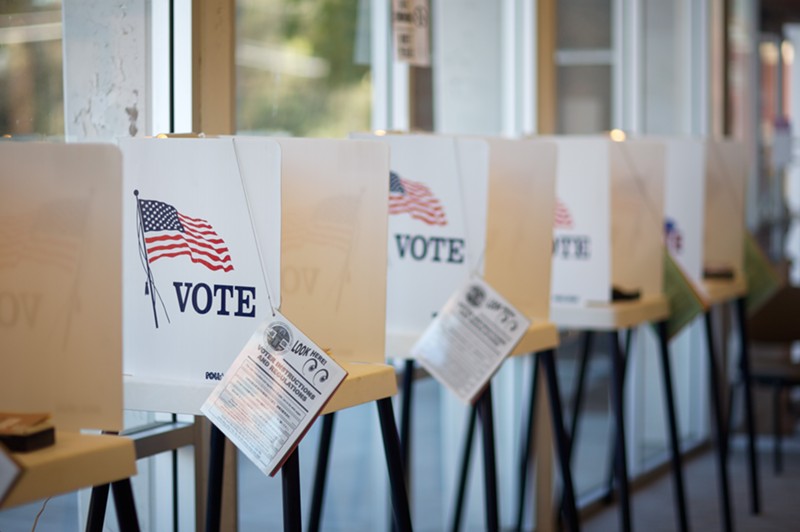The Texas Democratic Party filed a lawsuit last week challenging Texas' new ban on mobile voting, which took effect just before this election cycle. The Democratic Party is joined on the lawsuit by the Democratic Senatorial Campaign Committee and the Democratic Congressional Campaign Committee.
The new law states that all early voting stations must remain open for at least eight hours a day and for the full early voting period. Although the law, which was proposed and voted through by Republicans, was billed as a way to fight voter fraud and unethical voting practices, it primarily suppresses young votes and to some degree rural votes, as well, the Democrats argue.
“They intend to make it harder for certain populations to vote as a way to manipulate the vote,” said Chad Dunn, the Texas Democratic Party's lawyer.
Mobile voting and temporary voting stations made it easier for college students, people with limited mobility and rural populations to vote. Voting stations could be set up for a few days in one place and moved to a new location once everyone at the first place had a chance to vote.
The lawsuit alleges that by blocking this flexibility and requiring voting stations to be open for the full early voting periods — which many places cannot afford — the new law infringes on the First, 14th and 26th amendments.
The First Amendment guarantees American citizens the right to express their opinions freely, the 14th says that no state can infringe on the rights of all citizens of the country and the 26th guarantees the rights of young voters. By limiting their ability to cast votes, the lawsuit alleges, all of these rights are being infringed.
These rights cannot be discriminated against without a “legitimate governmental basis,” and there is none here, Dunn said.
“Republicans know Texas is changing, that’s why they’re trying to change the rules to make it harder for college students, seniors, the disability community, rural Texans, and survivors of natural disasters to cast their ballots,” said Texas Democratic Party Chair Gilberto Hinojosa in a statement.
College students and young voters tend to vote for liberal candidates and issues. The new law is a politically motivated attempt at suppressing them, Democrats say.
“This targets young voters as well as rural voters,” Dunn said.
Speaking to the Observer recently, Democratic legislative affairs director Glenn Maxey said Republicans rejected many amendments to the new law that would have allowed the exceptions for mobility-limited people.
Although Texas has long had low voter turnout and struggled with voting issues, last year's voter turnout was much higher than in past years, in part because of early voting access. But decreasing voting access will cut voting numbers back down, the lawsuit alleges.
This year is tough to compare with last year, because some early voting locations aren't traditionally open in offseason elections. But there are stations that were open last year that have not been able to open this year, the lawsuit says. And the potential closure of voting stations makes Democrats worried for the 2020 election cycle.
“Mobile voting is an essential pillar of making voting more accessible to the many Texans who need expanded access to the polls the most," Hinojosa said. "Texas Republicans' ending mobile voting is their latest attempt to curb the Democratic rise in the state and steal an election from the rising Texas electorate."
On Friday, the Texas Democratic party also filed a lawsuit challenging a Texas law that allows candidates from whichever political party is in power to appear at the top of the ballot. This automatically garners more votes for the Republicans, the lawsuit argues, citing research that confirms that candidates get some votes simply by appearing on the top of a ballot.
Dallas has taken some steps to make voting more fair. The city allows mayoral candidates to draw for the top of the ballot slot and arranged to fund some early voting stations on college campuses.

Audio By Carbonatix
[
{
"name": "Air - MediumRectangle - Inline Content - Mobile Display Size",
"component": "18855504",
"insertPoint": "2",
"requiredCountToDisplay": "2",
"watchElement": ".fdn-content-body",
"astAdList": [
{
"adType": "rectangle",
"displayTargets": "mobile"
}
]
},{
"name": "Editor Picks",
"component": "17105533",
"insertPoint": "4",
"requiredCountToDisplay": "1",
"watchElement": ".fdn-content-body",
"astAdList": [
{
"adType": "rectangleLeft",
"displayTargets": "desktop|tablet"
},{
"adType": "rectangleRight",
"displayTargets": "desktop|tablet|mobile"
}
]
},{
"name": "Inline Links",
"component": "18349797",
"insertPoint": "8th",
"startingPoint": 8,
"requiredCountToDisplay": "7",
"maxInsertions": 25
},{
"name": "Air - MediumRectangle - Combo - Inline Content",
"component": "17105532",
"insertPoint": "8th",
"startingPoint": 8,
"requiredCountToDisplay": "7",
"maxInsertions": 25,
"watchElement": ".fdn-content-body",
"astAdList": [
{
"adType": "rectangleLeft",
"displayTargets": "desktop|tablet"
},{
"adType": "rectangleRight",
"displayTargets": "desktop|tablet|mobile"
}
]
},{
"name": "Inline Links",
"component": "18349797",
"insertPoint": "8th",
"startingPoint": 12,
"requiredCountToDisplay": "11",
"maxInsertions": 25
},{
"name": "Air - Leaderboard Tower - Combo - Inline Content",
"component": "17105535",
"insertPoint": "8th",
"startingPoint": 12,
"requiredCountToDisplay": "11",
"maxInsertions": 25,
"watchElement": ".fdn-content-body",
"astAdList": [
{
"adType": "leaderboardInlineContent",
"displayTargets": "desktop|tablet"
},{
"adType": "tower",
"displayTargets": "mobile"
}
]
}
]












